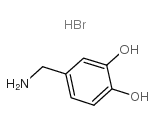3,4-DIHYDROXYBENZYLAMINE HYDROBROMIDE

3,4-DIHYDROXYBENZYLAMINE HYDROBROMIDE structure
|
Common Name | 3,4-DIHYDROXYBENZYLAMINE HYDROBROMIDE | ||
|---|---|---|---|---|
| CAS Number | 16290-26-9 | Molecular Weight | 220.06400 | |
| Density | 1.309g/cm3 | Boiling Point | 333.4ºC at 760mmHg | |
| Molecular Formula | C7H10BrNO2 | Melting Point | 184-186 °C(lit.) | |
| MSDS | Chinese USA | Flash Point | 155.5ºC | |
| Symbol |

GHS07 |
Signal Word | Warning | |
Use of 3,4-DIHYDROXYBENZYLAMINE HYDROBROMIDE3,4-Dihydroxybenzylamine hydrobromide (NSC 263475 hydrobromide) is an improved dopamine analog cytotoxic and inhibits DNA polymerase activity in melanoma cells[2]. 3,4-Dihydroxybenzylamine hydrobromide (NSC 263475 hydrobromide) displays growth inhibitory activity in melanoma cell lines with varying degrees of tyrosinase activity[2]. |
| Name | 3,4-dihydroxybenzylamine hydrobromide |
|---|---|
| Synonym | More Synonyms |
| Description | 3,4-Dihydroxybenzylamine hydrobromide (NSC 263475 hydrobromide) is an improved dopamine analog cytotoxic and inhibits DNA polymerase activity in melanoma cells[2]. 3,4-Dihydroxybenzylamine hydrobromide (NSC 263475 hydrobromide) displays growth inhibitory activity in melanoma cell lines with varying degrees of tyrosinase activity[2]. |
|---|---|
| Related Catalog | |
| In Vitro | 3,4-Dihydroxybenzylamine hydrobromide (1 μM-10 mM; 48 hours) inhibits the growth of all melanoma cell lines with an IC50 of 100 μM, while the SK-MELB cell line exhibits an IC50 of 122 μM. The IC50 values are 30, 84,90, and 68 μM for Human SK-MEL-30, SK-MEL-2, SK-MEL-3,RPMI-7951 cells, respectively. It exhibits IC50values of 10, 25, 67, and 184 μM for S91A,S91B, L1210, and SCC-25 cells, respectively[2]. 3,4-Dihydroxybenzylamine hydrobromide (1 μM-10 mM; 48 hours) cytotoxicity in SK-MEL-2 and SK-MEL-28 cell lines can be enhanced by application of buthionine sulfoximine (BSO). BSO treatment sensitizes marginally pigmented cells to the effects of 3,4-DHBA, and the presence of decreses IC50 values of 3,4-DHBA by 127% in the SK-MEL-28 cell line and by 148% in the SK-MEL-2 cell line[2]. Cell Viability Assay[1] Cell Line: Human and Murine Melanoma Cell Lines; Non-Melanoma Cell Lines Concentration: 1 μM-10 mM Incubation Time: 48 hours Result: Inhibited melanoma cell Lines growth. |
| In Vivo | 3,4-Dihydroxybenzylamine hydrobromide (intraperitoneal injection; 1000 mg/kg; 7 days) has the least toxic effect in non-tumor-bearing B6D2F1 mice,and mice is tolerated at this dose[3]. 3,4-Dihydroxybenzylamine hydrobromide (intraperitoneal injection; 200-800 mg/kg; 21 days) has different effects at different doses, the median life-span are 17, 24.5, 26, 29 and 25 days for 0 mg/kg, 200 mg/kg, 400 mg/kg, 600 mg/kg, and 800 mg/kg, respectively[3]. Animal Model: C57BL/6 mice with B6D2F1 cells[3] Dosage: 200 mg/kg, 400 mg/kg, 600 mg/kg, and 800 mg/kg Administration: Intraperitoneal injection Result: Exhibited increased life-span of 44%,46%, 70% and 50% for 200 mg/kg, 400 mg/kg, 600 mg/kg, and 800 mg/kg, respectively. |
| References |
| Density | 1.309g/cm3 |
|---|---|
| Boiling Point | 333.4ºC at 760mmHg |
| Melting Point | 184-186 °C(lit.) |
| Molecular Formula | C7H10BrNO2 |
| Molecular Weight | 220.06400 |
| Flash Point | 155.5ºC |
| Exact Mass | 218.98900 |
| PSA | 66.48000 |
| LogP | 2.21490 |
| Vapour Pressure | 1.32E-05mmHg at 25°C |
| Symbol |

GHS07 |
|---|---|
| Signal Word | Warning |
| Hazard Statements | H315-H319-H335 |
| Precautionary Statements | P261-P305 + P351 + P338 |
| Personal Protective Equipment | dust mask type N95 (US);Eyeshields;Gloves |
| Hazard Codes | Xi |
| Risk Phrases | R36/37/38 |
| Safety Phrases | S26-S36 |
| RIDADR | NONH for all modes of transport |
| WGK Germany | 3 |
| HS Code | 2922299090 |
| Precursor 0 | |
|---|---|
| DownStream 1 | |
| HS Code | 2922299090 |
|---|---|
| Summary | 2922299090. other amino-naphthols and other amino-phenols, other than those containing more than one kind of oxygen function, their ethers and esters; salts thereof. VAT:17.0%. Tax rebate rate:13.0%. . MFN tariff:6.5%. General tariff:30.0% |
|
Simultaneous determination of electroactive and non-electroactive food preservatives by novel capillary electrophoresis with amperometric detection.
Anal. Chim. Acta 678(1) , 39-43, (2010) A novel capillary electrophoresis and amperometric detection method was achieved by adding an electroactive additive (3,4-dihydroxybenzylamine, 3,4-DHBA) to the running buffer, so that both electroact... |
|
|
Selective extraction of catecholamines by packed fiber solid-phase using composite nanofibers composing of polymeric crown ether with polystyrene.
Biomed. Chromatogr. 29(1) , 103-9, (2014) For the first time, electrospun composite nanofibers comprising polymeric crown ether with polystyrene (PCE-PS) have been used for the selective extraction of catecholamines - dopamine (DA), norepinep... |
|
|
ERK5 induces ankrd1 for catecholamine biosynthesis and homeostasis in adrenal medullary cells.
Cell. Signal. 28 , 177-89, (2016) Extracellular signal-regulated kinases (ERKs) play important roles in proliferation, differentiation and gene expression. In our previous study, we demonstrated that both ERK5 and ERK1/2 were responsi... |
| EINECS 240-382-8 |
| 4-(Aminomethyl)catechol hydrobromide,DHBA hydrobromide |
| MFCD00012859 |
| 4-(aminomethyl)benzene-1,2-diol,hydrobromide |
| 3,4-Dihydroxybenzylamine hydrobromide |
![N-[(3,4-dihydroxyphenyl)methyl]nonanamide structure](https://image.chemsrc.com/caspic/390/139446-83-6.png) CAS#:139446-83-6
CAS#:139446-83-6
